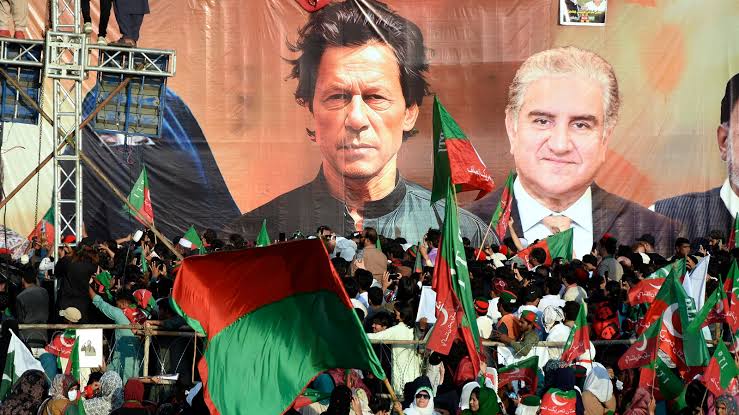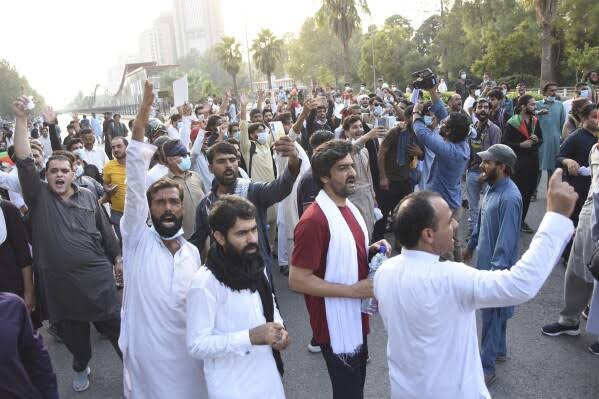Islamabad locked down to thwart a rally to support ex-PM Imran Khan

Authorities suspended cellphone service and blocked key roads into Pakistan’s capital with shipping containers Friday to try to thwart a rally by tens of thousands of activists seeking the release of imprisoned former Prime Minister Imran Khan.
Khan’s supporters were trying to march on Islamabad from the northwest Khyber Pakhtunkhwa province where Khan’s party holds power, defying a ban on rallies imposed this week by the national government of Prime Minister Shehbaz Sharif.
Sharif’s interior minister said armed supporters of Khan were among activists trying to reach the capital and warned them to stop, and has said they would be shown “no leniency.” Police swung batons and used tear gas to prevent rallygoers from entering capital.
Sharif’s government also deployed paramilitary rangers and additional police and shut schools in Islamabad and the nearby city of Rawalpindi after Khan’s Pakistan Tehreek-e-Insaf party refused to withdraw its call for the protest.
Videos posted online showed police placing shipping containers on bridges and roads on a key highway near Khyber Pakhtunkhwa province.
Officials said that the provincial government was trying to remove the blockades with heavy machinery.

The protest comes ahead of a summit of the Shanghai Cooperation Organization in Islamabad on Oct. 15, and Pakistani authorities announced they would deploy troops in the capital starting Saturday to secure the meeting. India’s foreign ministry confirmed Friday that its external affairs minister, Subrahmanyam Jaishankar, will attend.
On Friday, police reportedly arrested some of Khan’s party supporters from Islamabad, including two of his sisters.
Khan, Sharif’s main political rival, has been in prison for more than a year in connection with more than 150 criminal cases. He remains a popular figure despite the cases, which critics and his party say are politically motivated. He was ousted in 2022 through a no-confidence vote in Parliament and arrested in 2023 after a court handed him a 3-year jail sentence in a graft case.
Sharif came into power after the Feb. 8 vote which Khan says was rigged.
The suspension of cellphone service in Islamabad and Rawalpindi on Friday disrupted communications and affected basic services such as online banking, ride and food delivery services. Many people faced difficulties traveling because of the obstacles placed on the roads.
On Thursday, Interior Minister Mohsin Naqvi told Khan’s party to cancel the planned protest and warned that there would be “no leniency” if the ban on protests is defied.
He told reporters in Islamabad Friday that armed supporters of Khan were marching on Islamabad. “They should think what they are going to do with Pakistan by marching on Islamabad with weapons,” he said. “I am very clear that they are going launch an assault on Islamabad,” Naqvi said.
He said the government would not allow anyone to cause damage in the country. Khan’s spokesman, Zulfiqar Bukhari, rejected the government’s demand to withdraw the call for the protest, saying it was their constitutional right to hold a peaceful rally.
A message on Khan’s social media account urged supporters to join the protest. “The tyrants in power want to terrorize us,” it said.
“So go forth fearlessly, and remember if you still hesitate, to step forward and truly liberate yourself.”Sharif’s government says Khan’s party wants to weaken the country’s economy by staging violent protests despite the threat posed by the Pakistani Taliban, who have stepped up attacks in recent years.
Pakistan, which recently received a $7 billion loan from the International Monetary Fund, has been struggling to overcome an economic crisis.
On Friday, supporters of Khan gathered in Swabi, a city in Khyber Pakhtunkhwa province, to begin a march toward Islamabad.
Provincial Chief Minister Ali Amin Gundapur, who led a large rally last month near Islamabad demanding Khan’s release, planned to join the march along with tens of thousands of supporters who were heading to the capital in convoys of buses and trucks, but were forced to stop due to the roadblocks and teargas shelling by police.



